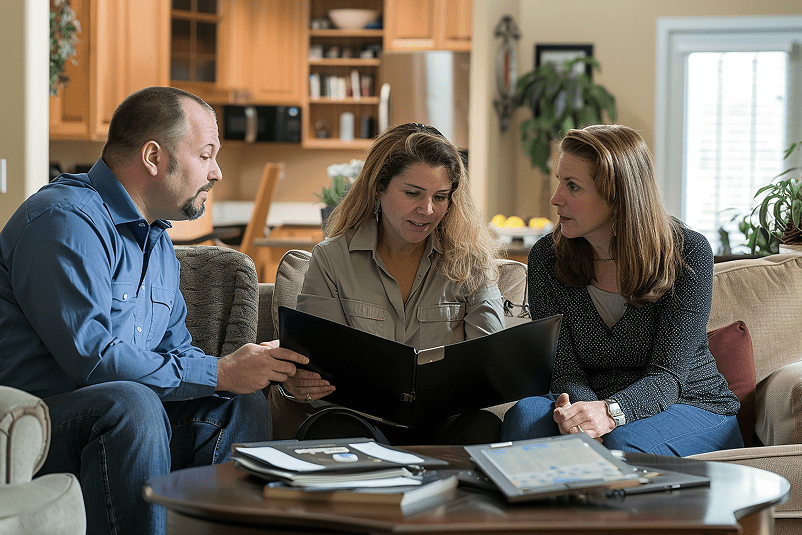Introduction to Bad Credit Mortgages
Understanding Credit History
Credit history plays a significant role in determining an individual’s eligibility for a mortgage. A credit report, which is maintained by credit reference agencies such as Checkmyfile, Experian, Equifax, or TransUnion. This provides a detailed record of an individual’s credit behaviour, including payments, debts, and credit inquiries.
Lenders use this information to assess an individual’s creditworthiness and determine the risk of lending to them. A poor credit history, which may include missed payments, county court judgments, or debt management plans, can make it more challenging to get a mortgage.
However, some specialist mortgage lenders may be willing to consider applicants with adverse credit, and a mortgage broker can help individuals navigate the process.
Can You Get a Mortgage with Bad Credit?
Yes, getting a mortgage with bad credit is possible. While traditional high street lenders may decline applications from individuals with poor credit history. Most lenders have varying criteria and policies, with some being more flexible than others.
Specialist mortgage lenders exist to support those who’ve experienced financial setbacks. There are many bad credit lenders that operate outside of the high street banks, offering tailored solutions for unique financial situations.
Bad credit doesn’t mean you’re financially irresponsible, it could be the result of life events such as divorce, redundancy, illness, or simply missed payments. What matters now is how you’re managing your finances and whether you can demonstrate stability and affordability. Lenders can see the last six years of your credit history including defaults. Many lenders will look past a poor credit score if the applicant shows overall financial reliability.
What Is a Bad Credit Mortgage?
A bad credit mortgage (also known as an adverse credit mortgage or subprime mortgage) is designed for individuals with a poor credit score or a history of credit problems, such as:
- CCJs (County Court Judgments)
- Defaults
- IVAs (Individual Voluntary Arrangements)
- Bankruptcy
- Debt Management Plans (DMPs)
- Missed payments
- Payday loan usage
- Repossessions
Bad credit mortgages are also known as ‘subprime mortgages’ and are designed for individuals with poor credit ratings.
These mortgages often come with slightly higher interest rates or lower LTVs (Loan-to-Value) than standard mortgages, but they provide a vital route to homeownership for many. Lenders charge higher interest rates for mortgages offered to individuals with bad credit, reflecting the increased risk they perceive.
How to Get a Mortgage with Bad Credit
1. Check Your Credit Reports
Start by reviewing your credit reports from all major credit reference agencies (Checkmyfile, Experian, Equifax, and TransUnion). Dispute any inaccuracies and understand what lenders will see. Using free services like Experian or Credit Karma allows you to check your credit report. Checking your credit score regularly can give you insight into your borrowing options and help you track improvements over time.
2. Work with a Specialist Mortgage Broker
A brokerage like Option Finance can match you with lenders that regularly approve bad credit applicants. Seeking professional advice from a mortgage adviser is crucial, as they can navigate the complexities of the mortgage application process and identify suitable lenders that align with your specific financial circumstances.
This improves your chances of approval and ensures you’re getting the most suitable deal. Mortgage brokers can help you find lenders who are more likely to approve your application despite bad credit, saving you time and effort.
3. Save a Bigger Deposit
The more you can put down (typically 15–30%), the more lenders will be willing to consider you, and the better the mortgage rates you may access. Individuals with bad credit may need to pay higher interest rates and provide a larger deposit.
A borrower with bad credit may be expected to provide a larger deposit of at least 20-25% of the property’s value, which can also improve their chances of approval.
4. Wait if Possible
If your bad credit issue is recent, such as a default or payday loan, waiting 6–12 months can improve your options significantly. Improving your credit worthiness during this period can increase your chances of mortgage approval.
If you build a positive credit history during that time, avoid applying for new credit before submitting a mortgage application. This can negatively impact your credit score. Waiting for credit issues to age can improve your chances of getting a better mortgage deal, as lenders may view older issues as less significant.
5. Provide Full Documentation
Lenders will want to see:
- Proof of income (payslips, accounts, or tax returns)
- Bank statements
- Explanations of your credit history
- A good record of rent payments (if applicable)
- Utility bills (to verify your residence)
Improving Your Odds of Approval
Improving your credit score can increase your chances of getting approved for a mortgage. This can be achieved by making timely payments, reducing debt, and avoiding new credit inquiries. Additionally, checking your credit report for errors and disputing any inaccuracies can help improve your credit score.
A larger deposit can also make you a more attractive borrower to lenders, as it reduces the risk of lending to you. Working with a mortgage broker who has experience in bad credit mortgages can also help you find the best mortgage deal and improve your odds of approval.
Self-Employed Individuals and Mortgage Applications
Self-employed individuals may face unique challenges when applying for a mortgage, particularly if they have a poor credit history. Lenders may view self-employment as a higher risk, and a poor credit history can exacerbate this risk. However, some specialist mortgage lenders may be willing to consider self-employed individuals with adverse credit, and a mortgage broker can help navigate the process.
It’s essential to provide detailed financial information, including accounts and tax returns, to demonstrate income and creditworthiness. A larger deposit and a good credit history can also improve the chances of getting approved for a mortgage as a self-employed individual.
Advantages of Bad Credit Mortgages
| Advantage | Explanation |
|---|---|
| Homeownership Despite Adverse Credit | You can still buy a property even with a poor credit file. However, bad credit mortgages often come with higher interest rates compared to prime mortgages. |
| Access to Specialist Advice | Mortgage brokers experienced in adverse credit can tailor solutions. |
| Improve Your Credit Over Time | Keeping up with mortgage repayments can rebuild your credit score. |
| More Options Than You Think | Many specialist lenders don’t use automated decisions and assess each case individually. |
Disadvantages of Bad Credit Mortgages
| Disadvantage | Explanation |
|---|---|
| Higher Interest Rates | Individuals with bad credit often face a higher interest rate due to the increased risk for lenders, meaning you may pay more than someone with a clean credit record. |
| Lower Maximum Loan-to-Value (LTV) | You may need a larger deposit (typically 15%–30%). |
| Fewer Lender Options | Most high street lenders will decline applications with active or recent credit issues. |
| Stricter Criteria | Lenders may impose limits on income types, affordability, or property types. |
Table: Specialist Bad Credit Mortgage Lenders (2025)
Here’s a breakdown of popular specialist lenders who consider bad credit applicants, including their typical criteria.
Each lender has its own lenders criteria for evaluating mortgage applications, which can affect a borrower’s chances of approval based on their credit scores and financial circumstances.
Note: This is a general guide and may vary depending on the applicant’s profile. Always speak to a broker for personalised advice. Specialist lenders consider mortgage applications on a case-by-case basis, taking into account the applicant’s unique circumstances.
| Lender | Max LTV | Credit Issues Accepted | Time Since Credit Issue | Notes |
|---|---|---|---|---|
| Pepper Money | Up to 85% | CCJs, Defaults, Missed Payments, DMPs | CCJs/Defaults > 6 months, even if unsatisfied | Manual underwriting. No credit score used. |
| Kensington Mortgages | Up to 90% | CCJs, Defaults, Payday Loans | Satisfied > 12 months | Accepts complex incomes. Good for self-employed. |
| Bluestone Mortgages | Up to 85% | CCJs, Defaults, IVAs, DMPs, Bankruptcy | Discharged > 3 years (Bankruptcy/IVA), 6 months (CCJs) | Flexible approach, including recent credit events. |
| Aldermore | Up to 85% | CCJs, Defaults, Missed Payments | Typically 12+ months old | Good for self-employed and applicants with complex income. |
| Precise Mortgages | Up to 85% | Defaults, DMPs, CCJs, IVAs | CCJs/Defaults > 6 months | Limited tolerance for active DMPs or unsatisfied CCJs. |
| The Mortgage Lender (TML) | Up to 85% | CCJs, Defaults, Payday Loans, Missed Payments | Case-by-case | Broad underwriting. Useful for near-prime applicants. |
Important: LTV and criteria can vary based on credit severity, deposit size, income type, and property value. Always check with a broker for the latest rates and policies.
Should You Wait or Apply Now?
If you’ve recently experienced a credit issue, waiting a little longer while improving your credit and saving a bigger deposit can open more doors. Financial circumstances play a crucial role in deciding whether to wait or apply now. However, if you’re in a strong position income-wise and can afford a larger deposit.
Applying now with a specialist lender may be your best option. Registering to vote can improve your credit score, which may also enhance your chances of approval.
Why Work with Option Finance for Bad Credit Mortgages?
At Option Finance, we specialise in mortgages for complex credit scenarios. Our team works with all major bad credit lenders and has access to exclusive deals that aren’t available on the high street.
Understanding one’s credit report from a credit reference agency can help in securing a mortgage.
Over 20 years of experience Full market access to specialist lenders Expert help with complex or recent credit issues Fast, honest, and personalised mortgage advice
Ready to Take the First Step?
Whether you’re a first-time buyer, remortgaging, or moving home, bad credit doesn’t have to hold you back.
Understanding credit scoring can help you prepare for a mortgage application. You can speak to one of our specialist mortgage brokers who would be able to guide you through the process. They will advise if there is a lender available and the maximum loan amount based on your circumstances. We are a whole of market mortgage brokerage with access to all lenders. Call us on 01332 470400 or complete the form with your details for us to give you a call back.
What our customers say
Marlon
25 Apr 2025
Showing our favourite reviews

Always attentive, helpful and efficient
Jonathan, 27 Jan 2025

Best Mortgage Broker in the UK!
Liam, 26 Nov 2024

Ben was really helpful in helping me…
George, 28 Aug 2024
FAQs
Can I get a mortgage if I’ve had defaults or CCJs?
Yes, many specialist lenders consider applicants with County Court Judgments (CCJs), defaults, and other credit issues—especially if they’re over 6–12 months old. A mortgage broker can help match you with lenders who assess applications on a case-by-case basis, not just your credit score.
How much deposit do I need for a bad credit mortgage?
Most bad credit lenders require a deposit of 15% to 30%, depending on the severity and recency of your credit issues. The more you can put down, the more options you’ll have and the better your interest rate is likely to be.
Will applying for a bad credit mortgage hurt my credit score?
If you’re working with a mortgage broker, they’ll approach lenders who perform soft credit checks during initial stages—meaning it won’t impact your score. Multiple hard searches, however, can harm your credit, which is why it’s best to go through a broker who knows which lenders to approach strategically.
How long after bankruptcy or an IVA can I apply for a mortgage?
Some lenders will consider applicants 3–6 years after discharge from bankruptcy or completion of an IVA. The key is showing financial stability and affordability since that time. Your broker can help find lenders with flexible criteria.
What documents will I need to apply for a bad credit mortgage?
You’ll typically need:
Recent payslips or tax returns
Bank statements
Proof of ID and address
A detailed explanation of your credit history
Evidence of rent payments (if applicable)
Having everything prepared strengthens your application and speeds up the process.
Ready to Take the First Step?
Whether you’re a first-time buyer, remortgaging, or moving home, bad credit doesn’t have to hold you back.
Understanding credit scoring can help you prepare for a mortgage application. You can speak to one of our specialist mortgage brokers who would be able to guide you through the process. They will advise if there is a lender available and the maximum loan amount based on your circumstances. We are a whole of market mortgage brokerage with access to all lenders.































